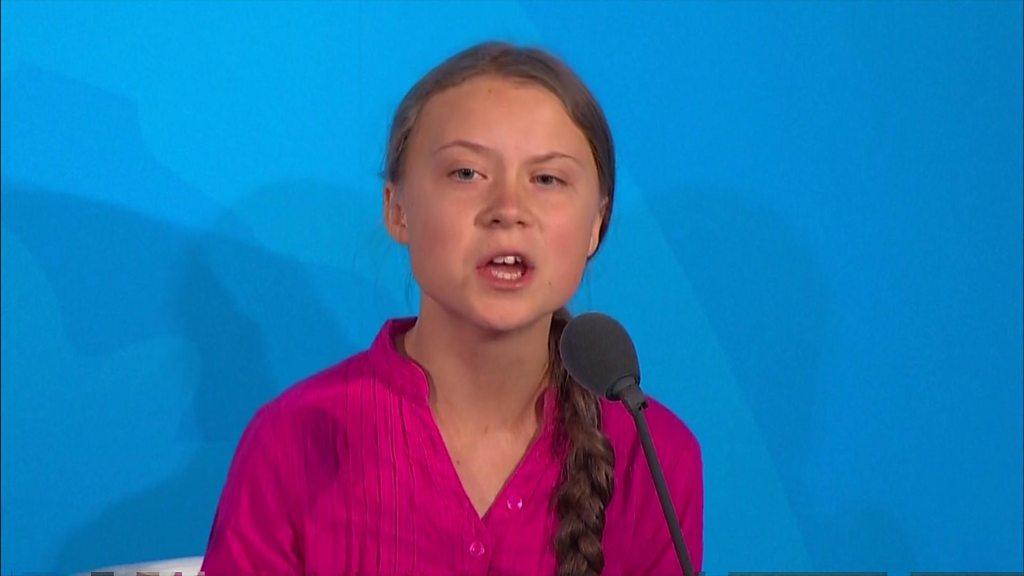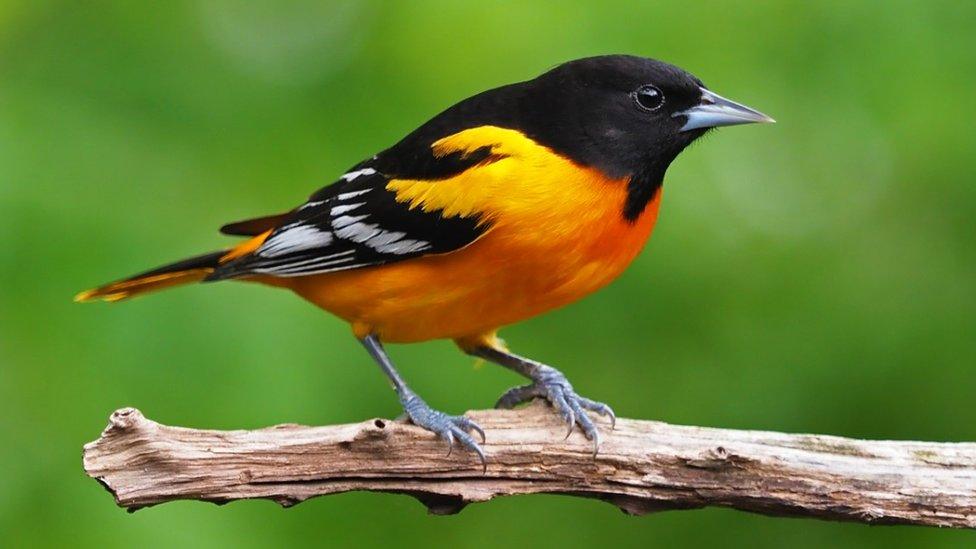Greta Thunberg: 'Leaders failed us on climate change'
- Published
"You are failing us" - Greta tells world leaders
Swedish campaigner Greta Thunberg has made a passionate speech to world leaders at the UN, accusing them of failing to act on climate change.
"You have stolen my dreams and my childhood with your empty words," she told a UN climate summit in New York.
About 60 world leaders are taking part in the one-day meeting organised by UN Secretary General António Guterres.
He earlier said countries could only speak at the summit if they came with action plans to cut carbon emissions.
US President Donald Trump, a climate change sceptic, had not been expected at the meeting - but he was briefly spotted in the audience.
Brazil and Saudi Arabia are among the countries staying away.
What did Greta Thunberg say?
In an emotional speech, she said: "This is all wrong. I shouldn't be up here. I should be back in school on the other side of the ocean, yet you all come to us young people for hope. How dare you?
"You have stolen my dreams and my childhood with your empty words," the 16-year-old said.
And she urged world leaders to act urgently, saying: "We will be watching you."
The moment Greta Thunberg saw President Donald Trump
What did world leaders say?
Mr Guterres, who organised the meeting, said the world was "in a deep climate hole" and that urgent action was needed.
"Time is running out, but it's not too late," he said.
German Chancellor Angela Merkel said her country would double to €4bn (£3.5bn; $4.4bn) it financial commitment to fight global warming.
BBC Weather examines what effects a warming world could have had on 2019's extreme weather
French President Emmanuel Macron said international organisations had pledged to release $500m in additional aid to protect tropical forests.
New Zealand's Prime Minister Jacinda Ardern said things "are starting to turn around" in the country.
"Our gross emissions peaked in 2006, over 80% of our electricity already comes from renewable hydro and wind, and we have begun an ambitious agenda.
"We have introduced in parliament the zero carbon bill, the purpose of which is to ensure New Zealand lives within the threshold of 1.5C of global warming necessary to avoid catastrophic weather events for our Pacific neighbours."
Scientists' warning
The summit comes days after several million people took part in a global climate strike led by youth activists.
Ahead of the meeting, scientists warned the signs and impacts of global warming were speeding up.
The World Meteorological Organization (WMO) said the amount of carbon dioxide going into the atmosphere between 2015 and 2019 had grown by 20%, external compared with the previous five years.
"We should listen to the loud cry coming from the schoolchildren," said Professor Brian Hoskins, chair of the Grantham Institute, Imperial College London, and professor of meteorology at the University of Reading.
"There is an emergency - one for action in both rapidly reducing our greenhouse gas emissions towards zero and adapting to the inevitable changes in climate," he said.

Scientists plead with politicians
By Roger Harrabin, BBC environment analyst
As the dangers of climate heating become ever more apparent, so does the absence of collective will to tackle the issue.
In 2015 in Paris, all the world's leaders sounded their determination to curb the emissions that were heating the climate.
The summit will see a host of initiatives from businesses and small- and medium-sized nations.
Millions of people join the environmental strike led by schoolchildren across the world on Friday
But President Trump is encouraging fossil fuel use in every way he can.
And China - in spite of its trend-setting commitment to solar and wind power - is still building new coal-fired power stations.
Even the UK, a global leader in climate policy-making, is veering away from its own medium-term targets to cut emissions.
The government is still aiming to expand Heathrow airport and increase the road network in a way that will increase emissions in those sectors.
Politicians appear to believe climate change can be challenged with a version of economic business as usual.
Their scientists are telling them with increasing desperation that we humans are facing an unprecedented threat in need of an unprecedented response.
Follow Roger on Twitter @rharrabin
- Published23 September 2019

- Published19 September 2019
